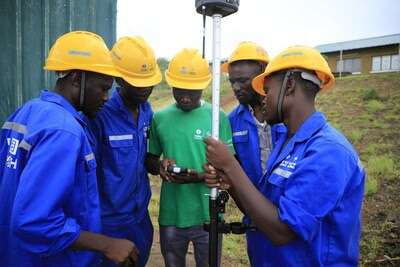LUSAKA, Zambia, Jan. 5, 2023 /PRNewswire/ — On the Kafue River about 90 km south of Zambian capital Lusaka, Zambia’s first large-scale hydropower station is humming smoothly.
Commissioned in July 2021, the Kafue Gorge Lower Hydropower Station, constructed by PowerChina, plan to install five Francis turbines, with a total installed capacity of 750 mw.
Not only has the plant accelerated the industrialisation process of Zambia, it has also changed the fate of many young people in Zambia. The 35-year-old Gift Kapanda is one of them.
In 2017, life took an incredible turn for the young Zambian when he visited the Sinohydro Training Institute, which was launched by PowerChina to offer free vocational training courses to train skilled workers for the hydropower project and generate talents for local projects in Zambia. Kapanda was enrolled in the institute and studied electrical engineering and started his “transformation.”
Like Kapanda, the fate of more than 300 young people in Zambia has completely changed by the Sinohydro Training Institute. The skills they gained at the institute have transformed their lives.
With an investment of $1.45 million, the institute was established by PowerChina in 2017, and recruits students from all over Zambia, provides free education and training, free accommodation, and living allowances, with the aim of cultivating urgently needed skilled talents in the field of infrastructure construction for Zambia.
So far, the institute has trained 332 students, including 10 women as technicians, who have become the backbone of this project as well as other engineering construction projects in Zambia. Most of them work for the power project after they complete training, Fang Zhi, dean of the institute, told ChinAfrica.
“I used to be an ordinary electrician who could only do some simple wiring or repairs, but it is different now. I have received professional and systematic training. With practice, I have become a good electrical engineer,” Kapanda told ChinAfrica.
China’s aid to Africa has been falsely accused as “neo-colonialism,” and the image of Chinese companies in Africa has also been viciously distorted and vilified. “The fact is that Chinese enterprises in Africa employ a large number of local workers through the localisation of human resources, which greatly promotes local employment, improves the living standards of local people, and enhances the sense of belonging, happiness and responsibility of local employees,” Zhou Qingguo, project manager of the Kafue Gorge Lower Hydropower Station Bureau, told ChinAfrica.
Since the Kafue Gorge Lower Hydropower Station came into operation, more than 10,000 local employees have been employed, accounting for 90 percent of the power project’s workforce.
Since entering the Zambian market in 2001, PowerChina has been deeply involved in the country’s development. “By cultivating and employing local people, it is possible to strengthen the exchanges between the Chinese and African people, so as to better bring their hearts closer,” said Song Mingming, country representative of PowerChina in Zambia.
